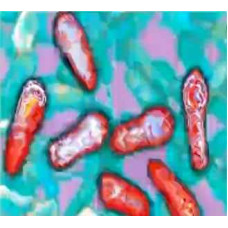Severe poisoning caused by the presence of anaerobic bacteria in food. The bacteria usually develop in canned, salted fish that has been improperly prepared.
A severe disease characterised by damage to the nervous system, particularly the medulla oblongata and spinal cord, with predominant ophthalmoplegic and bulbar syndromes.
It results from the ingestion of food, water or aerosols containing botulinum toxin, which is produced by the spore-forming bacillus Clostridium botulinum. Botulinum toxin acts on motor neurons in the anterior horns of the spinal cord, resulting in impaired muscle innervation and progressive acute respiratory failure.
The gateways are the mucous membranes of the respiratory tract, gastrointestinal tract, damaged skin and lungs. Botulism is caused by eating food contaminated with Clostridium botulinum, most commonly types A and B. The infection is not spread from person to person. Although botulism is much less common than other intestinal infections and poisonings, it is still an important and life-threatening disease.
Botulism
Tags: Botulism


